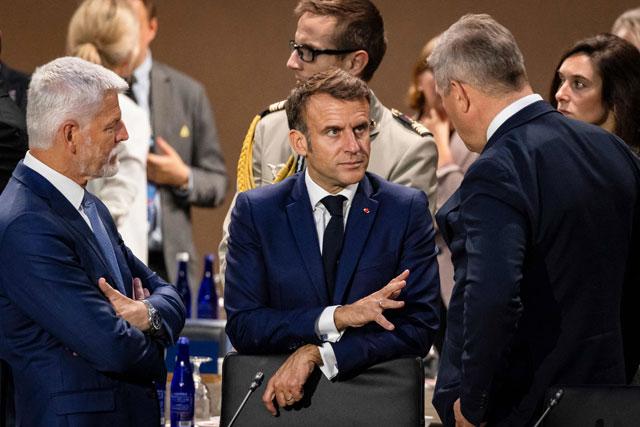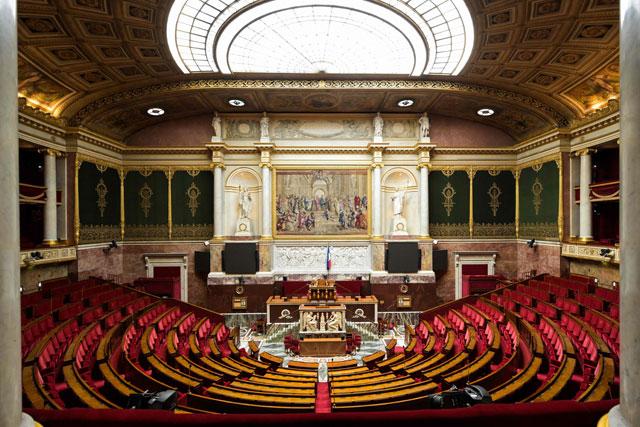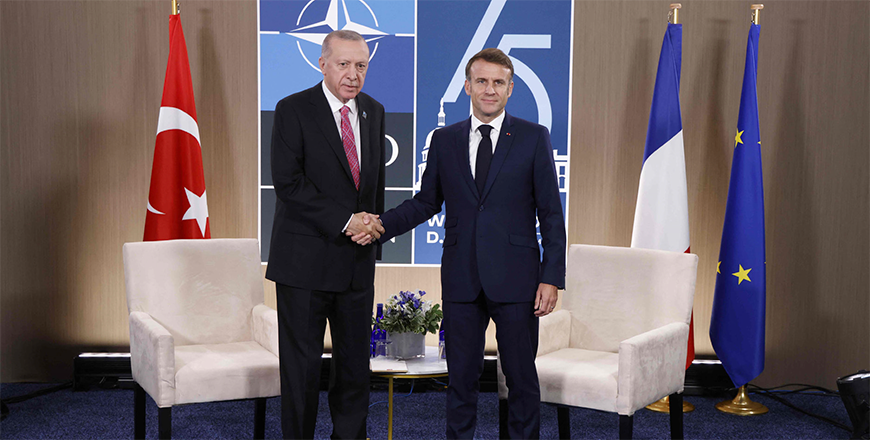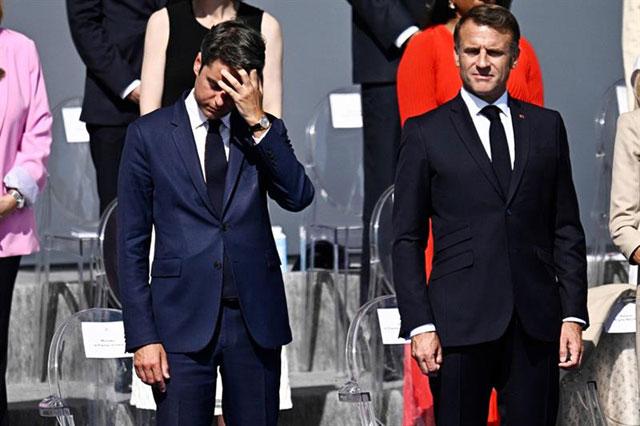You are here
Macron urges broad coalition to break French political deadlock
By AFP - Jul 11,2024 - Last updated at Jul 11,2024

French President Emmanuel Macron (centre) speaks to Iceland's Prime Minister Bjarni Benediktsson (right) and Czech Republic President Petr Pavel during the NATO 75th anniversary summit at the Walter E. Washington Convention Centre in Washington, DC, on Wednesday (AFP photo)
PARIS — President Emmanuel Macron on Wednesday put responsibility on parliament to negotiate a broad coalition reflecting France's "republican institutions" to break the stalemate following an inconclusive snap election.
"Nobody won," Macron said in a written message to voters published in French regional newspapers about the election.
"I am asking all political forces who recognise themselves in the republican institutions, the rule of law, parliamentary democracy, a European orientation and the defence of France's independence, to start a sincere and fair dialogue to build a solid, and by definition pluralist, majority," Macron said.
The formulation appeared designed to exclude Marine Le Pen's far-right RN Party, but also implicitly far-left firebrand Jean-Luc Melenchon's France Unbowed (LFI), a big portion of the left-wing New Popular Front (NFP) alliance.
The election called by Macron with the aim of "clarifying" the political landscape in the end left France with a hung parliament.
Centrists allied with Macron were looking Wednesday for an alliance with the right to counter ambitions by the NFP which emerged, surprisingly, with most seats in the National Assembly.
Prime Minister Gabriel Attal's government will remain in power as Paris makes final preparations for the Olympics, starting in just over two weeks.
But Attal's centrist group in parliament lost ground and the hunt is on for his successor.
French leftists believe that as the largest bloc in the new National Assembly with some 190 seats they are entitled to propose a new prime minister.
"Macron is clinging to denial and refuses to accept his defeat," LFI politician Manon Aubry posted on X.
But many in Macron’s centrist camp, which holds around 160 seats, would refuse to support a new government that includes figures from the hard left.
The president’s Renaissance outfit appeared divided as it sought allies in the lower chamber, with some seeking to include forces ranging from the centre left to the right in a broad coalition, and others only wishing to join forces with conservatives.
Aurore Berger, re-elected on Sunday and minister in charge of gender equality in the outgoing government, said her group wanted to ally with the conservative Republicans and other members of parliament near the centre.
Republicans parliamentary leader Laurent Wauquiez said his party would come up with a “legislative pact” it would propose to other groups.
‘Move forward’
Until Wednesday’s letter, Macron had laid low following the election, and was away on Wednesday for a NATO summit in Washington.
Interior Minister Gerald Darmanin, who was also re-elected, told the CNews broadcaster he could support a “right-wing prime minister”.
Former prime minister Edouard Philippe, a Macron ally, has called for a deal between the centrists and the conservatives “to move forward and be able to manage the country’s affairs for at least a year”.
But Francois Bayrou, a centrist Macron supporter, urged the president to name a prime minister who could “bring together” both sides of parliament.
Any contender would have to survive a confidence vote in parliament when it opens for business next week.
The broad leftist NFP alliance including Greens, Socialists, Communists and LFI has said they would suggest a candidate for prime minister by the end of the week.
Divisive LFI leader Melenchon has put forward 33-year-old Clemence Guette, who prepared his programme when he ran for president in 2022.
The more moderate Socialist leader Olivier Faure has also said that he would be willing to lead a Cabinet himself.
Despite doing less well than expected, the anti-immigration RN and allies still gained ground in the National Assembly, from 89 seats in 2022 to more than 140 today.
Winning an absolute majority “has only been postponed”, she told reporters.
The party’s 28-year-old leader, Jordan Bardella, urged his members of parliament to be “perfectly beyond reproach” in their posts, after a campaign in which several RN candidates were exposed as ignorant about policy or for former extremist behaviour.
Related Articles
PARIS — French parties sought to project strength and gather allies on Tuesday, with the government adrift following an election in which no
PARIS — French left-wingers attacked President Emmanuel Macron on Thursday after he called for a broad coalition government, demanding that
PARIS — Hopes of France's left-wing bloc finding a consensus candidate to lead the country's next government after an inconclusive snap elec


















